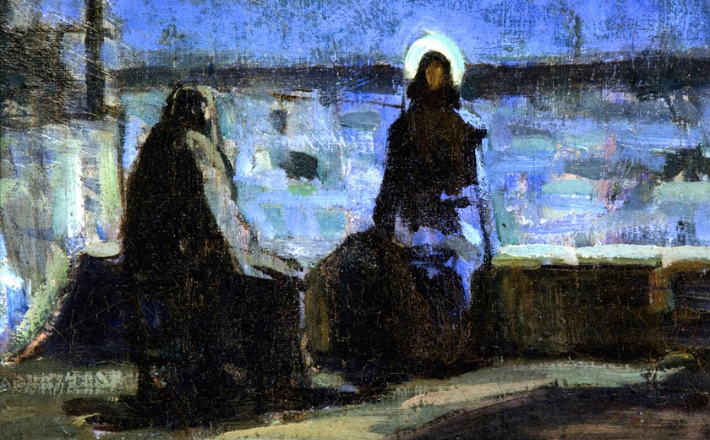Commentary on Numbers 21:4-9
At first, the text has an often-repeated theme from this wilderness period: The people complain, “Why have you brought us out of Egypt to die in the wilderness? For there is no food and no water, and we detest this miserable food” (Numbers 21:5). The people complain, God provides, and repeat. The pattern is familiar, except the complaint here is directed against God. It is usually directed against Moses or Aaron. Does the complaint directed to God instead of Moses prompt a different response?
We do not know, but what comes next is not the pattern we have seen since Exodus 15. God sends what the New Revised Standard Version calls “poisonous snakes.” The Hebrew words mean “fiery snakes” or “burning serpents.” As some commentators suggest, this word could represent a painful bite from a poisonous snake, and the New Revised Standard Version seems to adopt that reading. But the same word appears as “seraphim” in Isaiah 6:2 and refers to the beings that protect God’s throne, so this may indicate the snakes’ otherworldliness or that they are directly from God. Either way, these snakes bit the people, and “many Israelites died.”
This is not the response the wilderness generation had come to expect. However, the narratives in the book of Numbers have shown God’s growing anger at the people and their complaints. In Numbers 11, God burned the edges of the camp (11:1–2). Later in the same chapter, God gives them the meat they so wanted “until it comes out of your nostrils and becomes loathsome to you” (11:20).
Then in Numbers 14, God states, “Not one of you shall come into the land in which I swore to settle you, except Caleb son of Jephunneh and Joshua son of Nun” (verse 30). Then here in chapter 21, God sends snakes to bite the people. There is no intervention from Moses, as in Exodus 32, either. This is not how we like to see God, and this text can confirm every belief in the “bad Old Testament God.” Yet, at the same time, we know there are consequences for our actions. This text calls on us to struggle with theodicy and how our actions impact God. The question to contemplate is, “Can we push God too far?”
The story continues, and the people go to Moses, confess that they sinned, and ask Moses to pray for God to remove the snakes. Moses prays, and God instructs Moses to “make a poisonous [Hebrew: fiery] snake and set it on a pole so everyone who is bitten can look at it and live” (21:8). Moses makes a snake from bronze and puts it on a pole as instructed. It works, and when the people are bit, they look at the image and live. So the story implies that the snakes remain an ongoing threat. The bronze snake only preserves life going forward; it does not appear to help the people who have already died.
Why make the bronze snake? Does Moses violate the commandment against idols (Exodus 20:4–5) to save the people? Does God instruct Moses to make an idol? Later, Hezekiah sees the people’s devotion to this image as a violation of the Torah because they “burned incense to it” (2 Kings 18:4). He destroys the image. It seems there is no end to the issues we find in this puzzling text.
It is good for us to be uncomfortable occasionally. We should struggle with understanding God and our relationship with God, and there is no better time than Lent to stretch our knowledge and faith. We need to be reminded of the freedom of God to act, and that some of God’s actions are startling to us. We also need to contemplate how our actions impact God and others.
The text does not report why God is finally fed up, nor should we. Indeed, the text does not see God’s response as out of line or problematic. To complicate the issue further, Deuteronomy remembers God as delivering the people in a wilderness that was “an arid wasteland with poisonous snakes and scorpions” (8:11–16). God delivered the people as they traversed a land filled with snakes. So, is this text an example of God saving the people from what was an ongoing threat, as implied by the Deuteronomy text? It deepens the mystery of the text.
There are many unanswered questions here, but one thing is clear: it is about God and God’s relationship with these people. These people have challenged God again and again: These people who wander and at times have reason to worry and complain about food and water in this “arid wasteland filled with poisonous snakes and scorpions.” These people who have such an identity as Pharaoh’s slaves that they cannot reimagine themselves as God’s people and cannot place complete trust in God.
It is difficult to preach the Gospel text for today and not engage its referent text here. Preachers must avoid making the New Testament text superior, especially since it contains the greatly loved John 3:16. Any indication of supersessionism must be avoided or called out for what it is. If the Old Testament text at its heart is about God and God’s trying relationship with the people, then the John text reflects the depths of God’s love for the people, for they will act no better in the New Testament than in the Old. They are still refusing to listen to God, even as God incarnate lives among them. They are willing to kill their own salvation.
God, sin, theodicy, relationship, faithfulness, belief, and trust are a lot for a Sunday morning in March. Yet, these problematic texts stretch and grow our theological muscles. They force us to think of God in terms that are not our normal neural pathways. This text, with all its issues, is good for us.


March 10, 2024